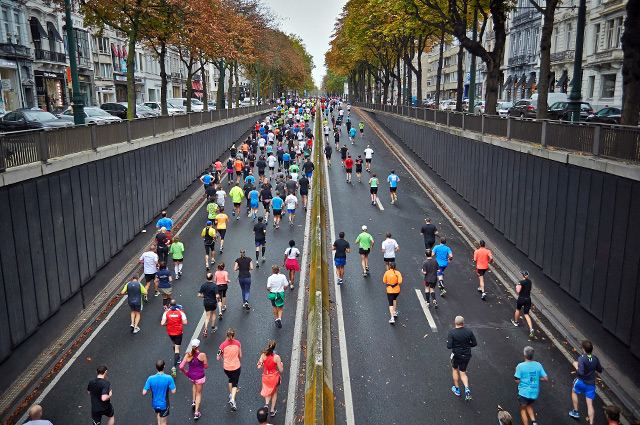Nutritional preparation for a social running event such as a fun run, starts two days earlier. What you consume during the event may also affect your experience and performance. Don't forget about recovery as well, to avoid the day after becoming a write-off.
Preparation begins with eating good-quality low-fat meals. Each meal should include a drink to optimize hydration and try to avoid alcohol completely in these days.
Carbohydrate intake is the key in preparation for a long-distance aerobic event. The meal the night before should be carbohydrate-based, such as pasta, rice or noodles, with a lean source of protein. It should also be something that you are familiar with and enjoy. Check that your urine is very clear the night before, indicating that you are well hydrated.
A good choice of breakfast for the morning of the event would be wholegrain cereal with light milk, or grainy toast and jam. Ensure you wake early enough to allow digestion of a good breakfast, as this is what adds the last major fuels for the event. Have a big drink with your meal too, pre-hydration will ensure you don't become too dehydrated during the event. In very hot conditions it is advisable to continue sipping fluids until the race starts.
 fun runners
fun runnersCarbohydrate loading is only appropriate for high-intensity events lasting longer than 90 minutes, so most fun runs don't fit in this category. However, a modified carbohydrate load can be utilized, meaning your meals the night before and the morning of the event should be carbohydrate based, and low in fat, to maximize fuel stores. Carbohydrate foods include pasta, rice, potatoes, breads and cereals. The food should also be something that you enjoy eating and your stomach is familiar with. If you get pre-race nerves, a liquid alternative may be helpful for breakfast like a fruit smoothie. This will also help with hydration before the event.
Your fluid requirements during the event will depend on your chosen distance and how hard you push yourself. Take advantage of the water stations around the course, and drink small amounts regularly. For those wanting to be competitive, plan to have a carbohydrate-based drink available to you at some stage around the course.
For low-intensity running like in a fun run, the body uses a combination of fuel stores for energy, and your carbohydrate (glycogen) and fat stores will not get depleted. Even if the event is quite long, your energy stores will probably not be fully depleted. However, low carbohydrate stores can still affect performance, so consuming carbohydrates during this event in the form of a sports drink or a carbohydrate energy bar will be beneficial to improve performance. The body may benefit from a maximum intake of 1g of carbohydrate per kg body weight per hour of activity. So for a 70kg runner that’s 70g of carbohydrate if the event takes an hour. Smaller amounts of carbohydrates can still be beneficial. Ensure that the carbohydrates taken during the event are easy to consume and easy to digest.
For optimum recovery after the event, it is best to have some form of carbohydrate to eat or drink immediately. This will replenish your muscle fuel stores and rehydrate you. Good choices include juicy fruit, a milk drink, a sandwich or a sweet cake. If your appetite is low, aim to consume at a minimum some sports drink, followed by a more substantial meal when you get home. The next meal should include a good source of protein to help repair muscle damage.
I wish you not good luck but good planning.
Related Pages
- Nutritional Strategies for Marathon Runners
- The History of Nutrition and the Olympic Marathon
- Nutrition notes for an ultra-endurance event
- Nutrition for Endurance and Adventure Sports
- Hydration in Sports
- About the marathon running event
- Sports Nutrition


 Current Events
Current Events